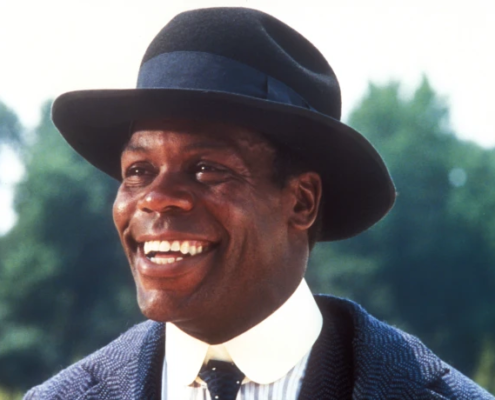“The Color Purple and the New Black”
Selection
It was not my original intention to speak so much today about the film version of The Color Purple, but as a widely seen product of popular culture, Spielberg’s film tends to take over in discussions of the story. In cultural criticism we often work hard to differentiate between various iterations of the same narrative, but cultural memory doesn’t work that way, and one of the things I’m interested in examining is the way that a musical version of something cannot escape – and must, in fact, respond to – the material it cites and references. As just one example of this that isn’t about masculinity, songwriter Allee Willis once shared that people constantly asked her if Quincy Jones’s song from the film “Sister” or “Miss Celie’s Blues” is sung in the musical. The movie is well remembered and well liked. So of course the musical has to deal with the charges of misandry that were aimed at Spielberg’s movie, and that is precisely what the musical’s creators attempted to do.
Marsha Norman, the musical’s librettist, “wanted to return to the book in its treatment of the men.” The way she accomplished this was to – and I’m quoting Norman here – “give Mister his full journey, which is all the way through to his redemption, to where he understands. […] And so he’s able to ask Celie to marry him at the end and also to do the work to bring her sister back. He really makes his amends. And she is able to accept them.” By choice, then, the musical pays a different kind of attention to the men in Alice Walker’s story. We see Albert change and work hard to make amends with Celie and his family. Even more, we watch and listen to Albert wrestle with what he’s done and how he got to be the way he is. After Celie leaves him, he sings “So tell me how a man do good when all he know is bad?” but eventually comes to the realization that he can only change things by changing his own behavior. And, as in the book, Celie reports that Albert finally decides that “it’s time he was good to some little girl,” as he begins to take care of Sofia and Buster’s daughter Henrietta. Indeed, at the moment when Celie is at her angriest at Albert – after she finds Nettie’s letters – she doesn’t threaten to kill him as she does in the novel or the film; the musical’s libretto redirects Celie’s anger at Albert (and the audience’s too) toward the white policemen who have locked Sofia in jail.
Perhaps just as important as the alteration to Albert’s portrayal, Sofia and Harpo are given a sexy love song late in act two in which we can see not only that their relationship is still sexually fulfilling but also that they’re sharing responsibilities and divvying up household duties between them in an equitable way. “Is there anything else I can do for you? / Any little thing you might want me to?” they ask each other, and the song manages to be both hot and reflective of an equitable distribution of domestic labor. The musical in these ways and several others attempted to alter The Color Purple’s relationship to Black maleness and, by most accounts, at least, the show succeeded.
In July of 2016, the performers in The Color Purple forged yet another relationship between this story and Black men in the United States. Heather Headley appeared on NPR’s All Things Considered on July 31st to promote the musical, and the actress spoke frankly to host Michel Martin about her Facebook appearances, about carrying the heaviness of the deaths of Philando Castile and Alton Sterling into the theatre, and about the truly complex work of a show that attempts to center women but also wants to lift up men. Just one day before this, Cynthia Erivo, Kyle Scatliffe (who played Harpo), and other members of the Purple ensemble appeared in a public performance piece called “Broadway Circle Up – This Is How We Shoot Back.” In this performance, members of the casts of The Lion King, Shuffle Along, The Color Purple, Motown, and Hamilton gathered to repurpose music from their shows in solidarity and “in protest of the continued loss of black lives due to prejudice.” The lyrics of The Color Purple’s final chorus – “It take a grain of love / To make a mighty tree / Even the smallest voice / Can make a harmony” take on new valences sung in this space with one hundred Black activists.
This choice of lyrics illuminates one of the central themes of The Color Purple in all its forms – the importance of speaking up, speaking out, and finding and using one’s voice. The power of the voice is, perhaps, a cliché in musical theatre, but speaking and singing are also central to Walker’s novel: consider for example the way Harpo mock’s his girlfriend Squeak’s way of speaking and then how she declares her desire to want to sing; or Albert saying he loves Shug because she speaks her mind like Sofia; or Celie saying that she writes the words of the novel itself because she doesn’t have the voice to speak but can write instead. The voice and how we use the voice – in prayer, in song, in protest – is a central theme of Alice Walker’s book.



